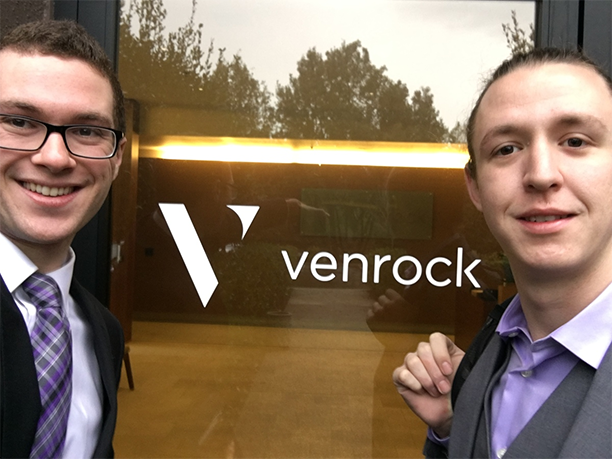Angelo Campus ’16 and Aaron Schwartz ’17 Deliver Clean Power, Off the Grid
For Angelo Campus ’16 and Aaron Schwartz ’17, CEO and COO of the renewable-energy startup BoxPower, the latest attraction in their Nevada City, Calif., warehouse is a massive solar array, 38 feet wide by 28 feet high, mounted atop a 20-foot-long shipping container.
“You can’t miss it,” Schwartz said. “Walking into work and seeing something really novel and really new that didn’t exist before we set our minds to this is a really gratifying experience.”
The solar panels are part of BoxPower’s second-generation containerized energy system, which Campus and Schwartz envision being used for a number of applications, providing off-grid power to underserved communities, disaster-relief organizations, temporary events like music festivals, and agricultural operations. The new legal cannabis industry in Colorado, Washington, and California could open a particularly promising market, Campus said, because many growers are located in remote areas.
BoxPower grew from a Princeton project in the EPICS program (Engineering Projects in Community Service), which Campus joined shortly after arriving at the University. He’d known about solar power from helping his father, a general contractor in California, and he was excited to get involved in the work that the EPICS team was doing to make a portable, renewable power source packed neatly into a shipping container — a cleaner alternative to the diesel generators that often power disaster-response centers.
The EPICS team won funding from the Environmental Protection Agency, successfully deployed its system in Bermuda, and published its work in a research paper. But after that, the idea seemed to lose steam. “Why stop there?” Campus recalled thinking. “We should turn this into a company.”
With help from entrepreneurship courses and a supportive network of alumni, Campus learned more about turning the technology into a promising business. He teamed with Schwartz, an operations research and financial engineering major who helped lead BoxPower’s efforts to gain funding through business-plan competitions. Both wrote senior theses related to renewable energy (Campus on energy inequality in Native American reservations, and Schwartz on optimizing microgrid energy systems).Schwartz, who had served as co-president of the Princeton’s Engineers Without Borders chapter, values the chance to work in sustainable energy in what he sees as “a pivotal point in human history.” BoxPower operates on two parallel tracks, marketing commercial applications while also making subsidized systems available to off-grid communities in need. In August, it installed solar and wind power at the Ramapough Lenape Nation prayer ground in Northern New Jersey; the company has a similar project planned for the Pine Ridge Girls’ School, located on a Lakota reservation in South Dakota.
BoxPower’s Princeton ties have been integral to its growth, Campus said. Earlier this year, it was part of the eLab’s summer incubator, and in 2016, it earned funding from the Princeton Entrepreneurship Council’s Alumni Entrepreneurs Fund, which matches investments from other venture-capital backers. The four members of BoxPower’s advisory board are alumni, as is the company’s sales and marketing head, Nick Horvath ’17.
While life in the startup world is exciting, it’s not glamorous, according to Campus, who said the staff is on a “beans and rice diet,” pouring every available penny into developing the business.
“There’s no other time in my life that I will be able to take such a gamble, support myself on next to nothing, and really put all my stakes into creating something new and innovative,” Campus said. “There’s no better time than now.”













No responses yet